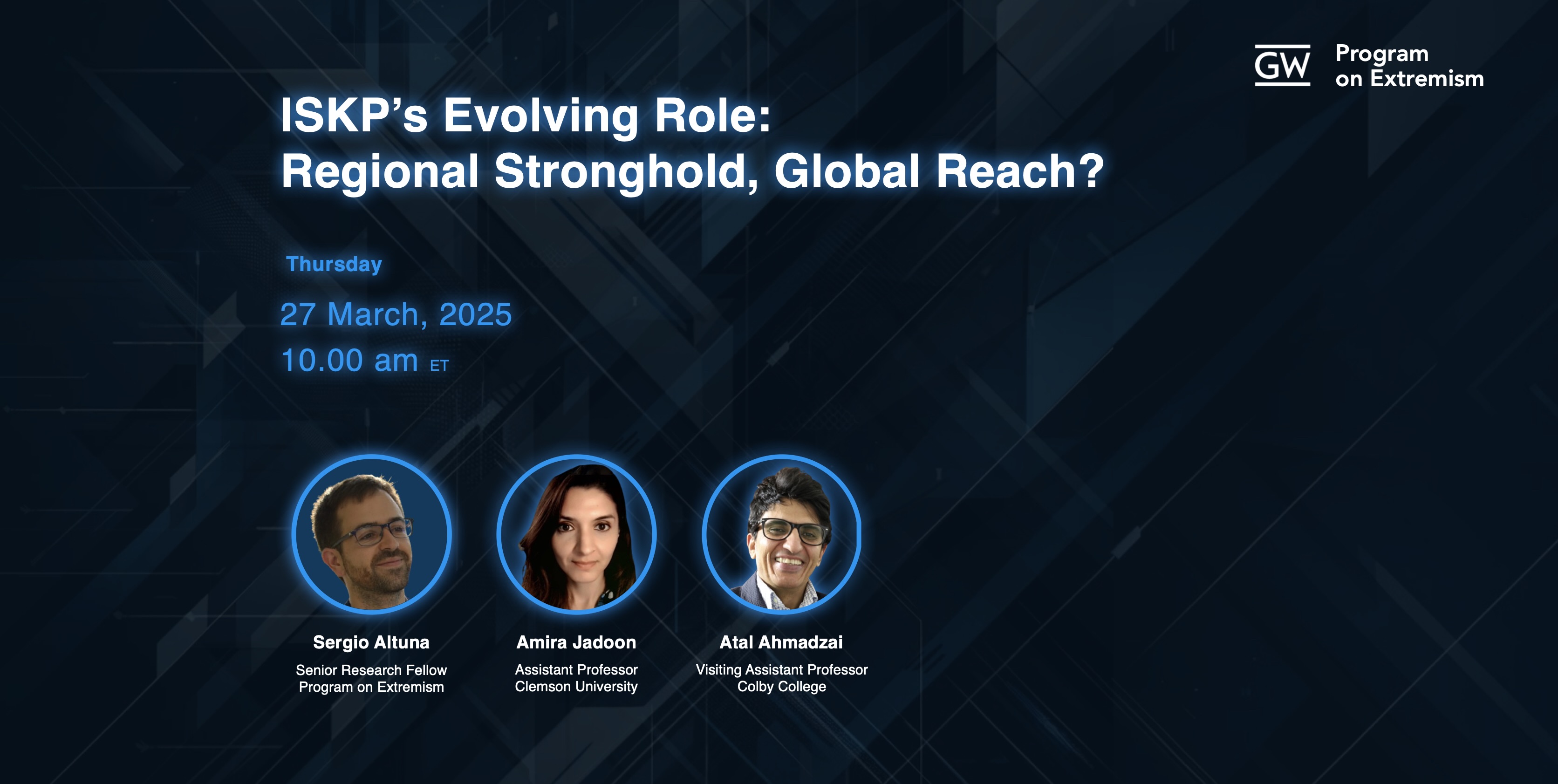ISKP’s Evolving Role: Regional Stronghold, Global Reach?

On March 27, the Program on Extremism at The George Washington University hosted an in-depth discussion on the evolving role of Islamic State Khorasan (ISIS-K) within the broader ISIS network. Initially focused on regional operations in South and Central Asia, ISIS-K has increasingly become a pivotal actor in transnational jihadism, particularly in its external operations that extend well beyond its stronghold, including into the West.
The panel, moderated by Senior Research Fellow Sergio Altuna, examined how ISIS-K has gained influence within ISIS’s structure, its role in the group’s External Operations Division, its growing ability to inspire and coordinate attacks beyond its traditional areas of operation and the broader threat it poses to Western security.
In order to discuss these matters, the Program on Extremism hosted:
- Dr. Amira Jadoon: Assistant Professor at Clemson University
- Dr. Atal Ahmadzai: Visiting Assistant Professor at Colby College
On March 27, 2025, the Program on Extremism (PoE) at The George Washington University hosted an event titled “ISKP’s Evolving Role: Regional Stronghold, Global Reach?”. The discussion included panelists Dr. Amira Jadoon, Assistant Professor at Clemson University, and Dr. Atal Ahmadzai, Visiting Assistant Professor at Colby College, who joined Dr. Sergio Altuna, Senior Research Fellow at PoE.
The panel began with Dr. Altuna’s overview of ISKP’s evolution into one of the most ambitious ISIS affiliates, highlighting the group’s increasing ability to conduct attacks beyond South and Central Asia. Laying the groundwork for the panel’s subsequent discussions, Dr. Altuna further touched on geopolitical factors and propaganda contributing to the ISKP’s rise.
Dr. Jadoon provided a comprehensive analysis of ISIS-K’s evolution, emphasizing its adaptability and longevity since its emergence in 2014. She highlighted how the group has leveraged the militant landscape of South and Central Asia, benefiting from overlapping agendas with other extremist factions, while simultaneously distinguishing itself through rivalry with the Taliban. Dr. Jadoon detailed key turning points in regional jihadism, such as the Cold War and the U.S. withdrawal from Afghanistan. She also underscored the group's strategic expansion, including its multilingual propaganda targeting Western audiences and its growing role within the broader Islamic State network.
Dr. Ahmadzai examined ISKP’s communication strategies, emphasizing its publishing activity and the narratives shaping its identity. He highlighted the ideological battle between ISIS-K and the Tehrik-i-Taliban Pakistan (TTP), with both groups using propaganda to assert their legitimacy. Dr. Ahmadzai then outlined the group's diverse target audiences, ranging from the general public to religious scholars and rival militant factions. He also explored ISIS-K’s multifront conflicts, including its opposition to Sufi Islam, Shi'a communities, and secular ideologies, positioning itself as a radical force in the region.
The Q&A session explored the complex dynamics between Al-Qaeda and ISKP in Afghanistan and Pakistan. The speakers addressed ISKP’s evolving propaganda, noting its emphasis on targeting near enemies like the Taliban while still positioning itself against Western states. Discussions also covered ISKP’s transnational reach, its diverse ethnic composition, and its ability to absorb counterterrorism losses, making it one of the deadliest ISIS affiliates. Other topics covered in the Q&A included ISKP’s influence on lone actors in the West, its relationship with the Turkistan Islamic Party, and the potential future role of women within the organization.

